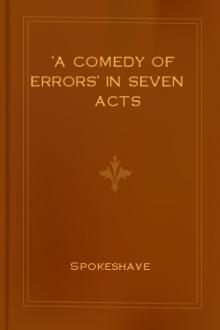Tales of St. Austin's by P. G. Wodehouse (unputdownable books .TXT) 📖

- Author: P. G. Wodehouse
Book online «Tales of St. Austin's by P. G. Wodehouse (unputdownable books .TXT) 📖». Author P. G. Wodehouse
As he mused drowsily on these portents, the distant sound of a bell came to his ears and completed the cure. It was the bell for chapel. He dragged his watch from under his pillow, and looked at it with consternation. Four minutes to seven. And chapel was at seven. Now Harrison had been late for chapel before. It was not the thought of missing the service that worried him. What really was serious was that he had been late so many times before that Merevale had hinted at serious steps to be taken if he were late again, or, at any rate, until a considerable interval of punctuality had elapsed.
That threat had been uttered only yesterday, and here he was in all probability late once more.
There was no time to dress. He sprang out of bed, passed a sponge over his face as a concession to the decencies, and looked round for something to cover his night-shirt, which, however suitable for dormitory use, was, he felt instinctively, scarcely the garment to wear in public.
Fate seemed to fight for him. On one of the pegs in the wall hung a mackintosh, a large, blessed mackintosh. He was inside it in a moment.
Four minutes later he rushed into his place in chapel.
The short service gave him some time for recovering himself. He left the building feeling a new man. His costume, though quaint, would not call for comment. Chapel at St Austin's was never a full-dress ceremony. Mackintoshes covering night-shirts were the rule rather than the exception.
But between his costume and that of the rest there was this subtle distinction. They wore their own mackintoshes. He wore somebody else's.
The bulk of the School had split up into sections, each section making for its own House, and Merevale's was already in sight, when Harrison felt himself grasped from behind. He turned, to see Graham.
'Might I ask,' enquired Tony with great politeness, 'who said you might wear my mackintosh?'
Harrison gasped.
'I suppose you didn't know it was mine?'
'No, no, rather not. I didn't know.'
'And if you had known it was mine, you wouldn't have taken it, I suppose?'
'Oh no, of course not,' said Harrison. Graham seemed to be taking an unexpectedly sensible view of the situation.
'Well,' said Tony, 'now that you know that it is mine, suppose you give it up.'
'Give it up!'
'Yes; buck up. It looks like rain, and I mustn't catch cold.'
'But, Graham, I've only got on—'
'Spare us these delicate details. Mack up, please, I want it.'
Finally, Harrison appearing to be difficult in the matter, Tony took the garment off for him, and went on his way.
Harrison watched him go with mixed feelings. Righteous indignation struggled with the gravest apprehension regarding his own future. If Merevale should see him! Horrible thought. He ran. He had just reached the House, and was congratulating himself on having escaped, when the worst happened. At the private entrance stood Merevale, and with him the Headmaster himself. They both eyed him with considerable interest as he shot in at the boys' entrance.
'Harrison,' said Merevale after breakfast.
'Yes, sir?'
'The Headmaster wishes to see you—again.'
'Yes, sir,' said Harrison.
There was a curious lack of enthusiasm in his voice.
3 — L'AFFAIRE UNCLE JOHN
(A Story in Letters)
IFrom Richard Venables, of St Austin's School, to his brother Archibald Venables, of King's College, Cambridge:
Dear Archie—I take up my pen to write to you, not as one hoping for an answer, but rather in order that (you notice the Thucydidean construction) I may tell you of an event the most important of those that have gone before. You may or may not have heard far-off echoes of my adventure with Uncle John, who has just come back from the diamond-mines—and looks it. It happened thusly:
Last Wednesday evening I was going through the cricket field to meet Uncle John, at the station, as per esteemed favour from the governor, telling me to. Just as I got on the scene, to my horror, amazement, and disgust, I saw a middle-aged bounder, in loud checks, who, from his looks, might have been anything from a retired pawnbroker to a second-hand butler, sacked from his last place for stealing the sherry, standing in the middle of the field, on the very wicket the Rugborough match is to be played on next Saturday (tomorrow), and digging—digging—I'll trouble you. Excavating great chunks of our best turf with a walking-stick. I was so unnerved, I nearly fainted. It's bad enough being captain of a School team under any circs., as far as putting you off your game goes, but when you see the wicket you've been rolling by day, and dreaming about by night, being mangled by an utter stranger—well! They say a cow is slightly irritated when her calf is taken away from her, but I don't suppose the most maternal cow that ever lived came anywhere near the frenzy that surged up in my bosom at that moment. I flew up to him, foaming at the mouth. 'My dear sir,' I shrieked, 'are you aware that you're spoiling the best wicket that has ever been prepared since cricket began?' He looked at me, in a dazed sort of way, and said, 'What?' I said: 'How on earth do you think we're going to play Rugborough on a ploughed field?' 'I don't follow, mister,' he replied. A man who calls you 'mister' is beyond the pale. You are justified in being a little rude to him. So I said: 'Then you must be either drunk or mad, and I trust it's the latter.' I believe that's from some book, though I don't remember which. This did seem to wake him up a bit, but before he could frame his opinion in words, up came Biffen, the ground-man, to have a last look at his wicket before retiring for the night. When he saw the holes—they were about a foot deep, and scattered promiscuously, just where two balls out of three pitch—he almost had hysterics. I gently explained the situation to him, and left him to settle with my friend of the check suit. Biffen was just settling down to a sort of Philippic when I went, and I knew that I had left the man in competent hands. Then I went to the station. The train I had been told to meet was the 5.30. By the way, of course, I didn't know in the least what Uncle John was like, not having seen him since I was about one-and-a-half, but I had been told to look out for a tall, rather good-looking man. Well, the 5.30 came in all right, but none of the passengers





Comments (0)